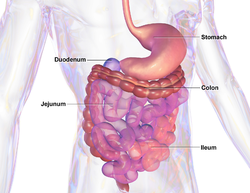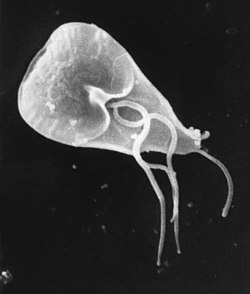Intestinal parasite infection

Editor-In-Chief: Prab R Tumpati, MD
Obesity, Sleep & Internal medicine
Founder, WikiMD Wellnesspedia &
W8MD's medical weight loss NYC, sleep center NYC
Philadelphia medical weight loss and Philadelphia sleep clinics
| Intestinal parasite infection | |
|---|---|

| |
| Synonyms | N/A |
| Pronounce | N/A |
| Specialty | N/A |
| Symptoms | Diarrhea, abdominal pain, weight loss, fatigue |
| Complications | Malnutrition, anemia, intestinal obstruction |
| Onset | Varies depending on the parasite |
| Duration | Can be acute or chronic |
| Types | N/A |
| Causes | Helminths, protozoa |
| Risks | Poor sanitation, contaminated food or water, travel to endemic areas |
| Diagnosis | Stool test, endoscopy, serology |
| Differential diagnosis | Irritable bowel syndrome, inflammatory bowel disease, celiac disease |
| Prevention | Improved sanitation, safe drinking water, proper food handling |
| Treatment | Antiparasitic drugs, rehydration therapy |
| Medication | Albendazole, metronidazole, ivermectin |
| Prognosis | N/A |
| Frequency | Common in tropical and subtropical regions |
| Deaths | N/A |
Intestinal parasite infection refers to a condition where an organism, known as a parasite, lives within the intestine of a host organism, often causing harm. These parasites can range from microscopic organisms, such as protozoa, to larger multicellular organisms, such as worms.
Types of Intestinal Parasites[edit]
There are several types of intestinal parasites that can infect humans. These include:
- Protozoa: These are single-celled organisms that can multiply within the host. Examples include Giardia lamblia and Cryptosporidium species.
- Helminths: These are larger, multicellular organisms that cannot multiply within the human body. Examples include tapeworms, roundworms, and flukes.
Transmission[edit]
Intestinal parasites are typically transmitted through the fecal-oral route. This can occur when an individual ingests food or water contaminated with feces containing the parasite. Some parasites, such as certain types of roundworms, can also be transmitted through the skin.
Symptoms[edit]
The symptoms of an intestinal parasite infection can vary greatly depending on the type of parasite and the severity of the infection. Common symptoms can include diarrhea, abdominal pain, nausea, vomiting, and weight loss. In severe cases, the infection can lead to malnutrition and anemia.
Diagnosis[edit]
Diagnosis of an intestinal parasite infection typically involves a stool test, where a sample of the patient's feces is examined under a microscope for the presence of the parasite. In some cases, additional tests may be needed, such as a blood test or imaging studies.
Treatment[edit]
Treatment for an intestinal parasite infection typically involves antiparasitic medication. The specific medication used will depend on the type of parasite involved. In some cases, additional treatment may be needed to address complications of the infection, such as rehydration therapy for severe diarrhea.
Prevention[edit]
Prevention of intestinal parasite infections primarily involves good hygiene practices, such as regular hand washing, especially before eating and after using the toilet. It is also important to ensure that food and water are safe to consume, particularly in areas where these infections are common.

Ad. Transform your life with W8MD's Budget GLP-1 injections from $49.99


W8MD offers a medical weight loss program to lose weight in Philadelphia. Our physician-supervised medical weight loss provides:
- Weight loss injections in NYC (generic and brand names):
- Zepbound / Mounjaro, Wegovy / Ozempic, Saxenda
- Most insurances accepted or discounted self-pay rates. We will obtain insurance prior authorizations if needed.
- Generic GLP1 weight loss injections from $49.99 for the starting dose of Semaglutide and $65.00 for Tirzepatide.
- Also offer prescription weight loss medications including Phentermine, Qsymia, Diethylpropion, Contrave etc.
NYC weight loss doctor appointmentsNYC weight loss doctor appointments
Start your NYC weight loss journey today at our NYC medical weight loss and Philadelphia medical weight loss clinics.
- Call 718-946-5500 to lose weight in NYC or for medical weight loss in Philadelphia 215-676-2334.
- Tags:NYC medical weight loss, Philadelphia lose weight Zepbound NYC, Budget GLP1 weight loss injections, Wegovy Philadelphia, Wegovy NYC, Philadelphia medical weight loss, Brookly weight loss and Wegovy NYC
|
WikiMD's Wellness Encyclopedia |
| Let Food Be Thy Medicine Medicine Thy Food - Hippocrates |
Medical Disclaimer: WikiMD is not a substitute for professional medical advice. The information on WikiMD is provided as an information resource only, may be incorrect, outdated or misleading, and is not to be used or relied on for any diagnostic or treatment purposes. Please consult your health care provider before making any healthcare decisions or for guidance about a specific medical condition. WikiMD expressly disclaims responsibility, and shall have no liability, for any damages, loss, injury, or liability whatsoever suffered as a result of your reliance on the information contained in this site. By visiting this site you agree to the foregoing terms and conditions, which may from time to time be changed or supplemented by WikiMD. If you do not agree to the foregoing terms and conditions, you should not enter or use this site. See full disclaimer.
Credits:Most images are courtesy of Wikimedia commons, and templates, categories Wikipedia, licensed under CC BY SA or similar.
Translate this page: - East Asian
中文,
日本,
한국어,
South Asian
हिन्दी,
தமிழ்,
తెలుగు,
Urdu,
ಕನ್ನಡ,
Southeast Asian
Indonesian,
Vietnamese,
Thai,
မြန်မာဘာသာ,
বাংলা
European
español,
Deutsch,
français,
Greek,
português do Brasil,
polski,
română,
русский,
Nederlands,
norsk,
svenska,
suomi,
Italian
Middle Eastern & African
عربى,
Turkish,
Persian,
Hebrew,
Afrikaans,
isiZulu,
Kiswahili,
Other
Bulgarian,
Hungarian,
Czech,
Swedish,
മലയാളം,
मराठी,
ਪੰਜਾਬੀ,
ગુજરાતી,
Portuguese,
Ukrainian
